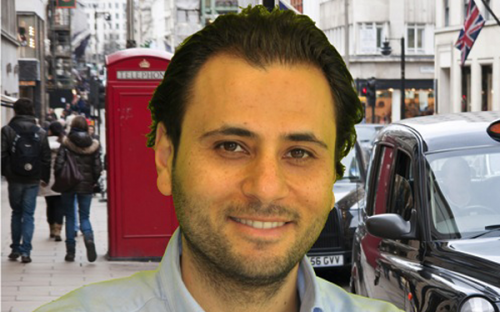LBS and Cass Master's start-up is set to find success with smartphone app for ride-sharing taxis. But the market is crowded.
Just before the end of a lunch-time call with Bassem Barake, one of two business schoolers behind smartphone start-up Funryde Ltd, the Canadian entrepreneur drops a bomb down the phone line. His ride-sharing application, founded three years out of one of London’s priciest business schools, doesn’t allow profit.Clearly a man who isn’t discouraged by capital – the co-founders pooled personal funds into the venture – he reveals that profit margins have been put on hold. Perhaps this is unsurprising for an upstarter who has spent the past 12 months developing an environmentally conscious social transport platform.
London-based Funryde has been ferrying passengers from Big Ben to Brixton. It is in the business of ride-sharing – where car-drivers can pick-up passengers who are going in a similar direction and earn a quick buck on the side. So far it has plugged 2,000 downloads, which is comparatively minute to London’s mammoth population. But the fledgling founders are ambitious.
“Is the ridesharing model disruptive? Perhaps it is, but such are most inventions of real value. It is those very disruptions and innovations that keep advancing the way we live,” says Ammar Halabi, Funryde’s CEO. Ammar and Bassem will hope to join the ranks of promising taxi-app upstarts including Uber, Hailo and GrabTaxi, the latter also founded by MBA graduates.
But first up they must bring home the bacon. Funryde’s success rests solely on whether the founders can land an insurance deal to cover both their drivers and customer-passengers.
“The model won’t allow any profit until we find an insurance premium,” says Bassem, who graduated from Cass Business School in 2011. “However, we are into serious talks with insurance companies to come up with an insurance premium that covers that part of the trip,” he adds. “We want to make sure everyone is safe.”
It would mark a significant turning point for a company that Bassem co-founded with Ammar, the London Business School grad who came up with the idea, in August last year. Although the pair studied at business schools which are a stone’s throw apart, they held discussions via Skype.
In Bassem’s telling, Ammar was looking for a technical lead for his fledgling firm, and put the word out through his personal network. They clicked instantaneously, and developed a business plan to penetrate the British market.
At the time, Bassem was heading another start-up, software solutions company uTouch, in Ottawa. Bassem may have studied in London, but he is a thoroughbred Canadian – it was where he studied his first degree and MA, in various engineering disciplines, and began a technical-based career.
It explains why the Master's graduate is the company’s technical lead. With the help of freelancers and students from Imperial College and City University, Cass’ bass, he developed the smartphone app. “I have really good experience with programming,” says Bassem.
Critics might suggest that Funryde has not come far enough in a year – a couple of thousand downloads is nothing to rave about. There are also further complications; the niche market is crowded. Established companies including Sidecar and Lyft base their services on ride-sharing. Uber, the taxi-app market leader, also offers ride-sharing. To make matters worse, ride-sharing has been deemed illegal in some US cities.
Bassem’s riposte is that download figures are not the most important piece of the puzzle. “You can have two-million downloads but if there are not enough people to engage with it, it doesn’t mean anything,” he says, matter-of-factly. There were earlier complications with the app, he says, and since launching in February they have had “more than anticipated downloads”.
It is also worth pointing out that Funryde is still in its soft-launch. The founders will no doubt expect a bigger slice of the market once the trial stage is over.
It is too early to make a call on whether Funryde can achieve this, but one thing is clear: they have received plenty of backing. In just a year, the start-up has already received the Deloitte Institute of Innovation and Entrepreneurship Founders Award. Funryde is sponsored by UK Trade and Investment, a government-funded support vehicle for SMEs, and have landed a spot on LBS' incubator. The rest of the cash came from the founders’ own pockets.
The business is advertising seven new job positions, including chief of marketing, and accepts volunteers.
It has a standardised algorithm that determines the estimated costs of a journey – factoring in distance, time of day, and so on – and the app suggests a price that a rider pays at the end of a journey. “On average it’s less than a pound a mile,” says Bassem. Users have the option to increase or decrease that amount on their smartphones.
Bassem says that this service is 60%-70% cheaper than using one of London’s famous black cabs. The company plans to take a cut of whatever price a user pays their driver, all being well.
The problem they face now is first convincing average Joe’s to sign-up as drivers, and then convincing potential passengers to hop into cars with strangers. “We are raising awareness that not anyone can be a driver,” says Bassem.
Indeed, they have to pass a registration process, and provide documents including a driver’s license. The company then runs a check of their driving records, as well as a security check and a background check, says Bassem. Once they begin driving, they are given ratings by users which are displayed on their profiles, as well as a profile picture.
One of their main ambitions is to reduce the amount of cars on the road. Funryde also runs a second service, a carbon reduction initiative, for private networks.
The start-up is located in Tech City – a cluster of technology SMEs in East London – which is an “amazing” experience. “It made a lot of difference – the amount of learning we get from others is huge,” says Bassem.
That has seemingly been the secret to Funryde’s near-success. The biggest benefit of attending business school has been cultivating a network.
“The experience that you learn is huge – it’s like having another degree,” says Bassem. “The network is massive.” He will need to utilize every ounce of it to drive Funryde to start-up stardom.
Student Reviews
Best Journalism school in Europe
When I first stepped onto the campus of City, University of London, I knew I was in for a ride - and not just on the Tube! With its vibrant energy and an impressive repertoire of programs, City U became my home away from home.
The Journalism program was kind of a big deal. Rumour was that we were the best in Europe!
The lecturers were not just experts in their field; they’re practically journalistic royalty. They were invested, passionate, and had a knack for turning the most flat press release into a riveting news story. With their guidance, I’ve learned to navigate the chaotic world of media like a pro.
The campus was a melting pot of every culture, being that we had such a diverse international crowd.
Being in the heart of London, I had the world at my fingertips - there was always a new corner to explore, a hidden gem of a cafe to discover, or a street performer!
City, University of London wasn't just a university; it was a chapter in my life story that I’ll never forget.
Learning environment
The teacher-learner ration is manageable, giving each learner a chance to gain personal attention. It is also easier following up on the progress of a student, as the numbers per class is not large. the conducive environment for learning includes clean classes, standard desks, world class instructional facilities and the opportunity to engage lecturers even after their sessions. The team spirit at City is above board, with learners getting chance to learn both from instructors and colleagues. This is the university of choice; the place to be.
Classes
I liked that each class had a manageable number of learners, making the professor-learner ratio favor knowledge acquisition. I also liked that study schedules were manageable, and not overwhelming. The focus on talents and gifts even within the learning environment makes it possible for learners to achieve the best of their potential, and this has worked to the advantage of those that have schooled at City, University of London
Classes
The diversity at City University facilitates interactions and is a direction toward the unity of the world. The classes are well built to match the number and needs of all students regardless of the elements of diversity that set people apart. The use of technology in delivery makes learning even more interesting and achievable. At City University there is no distinction pegged on the issues that make people unique.
professors
The team of lecturers at the Uiversity are well experienced. Their level of insight and the methodologies of delivery works for the interes of the leaeners. My learning experience was largely boosted by the level of knowledge of the professors at the institution, and their passion to transfer the same to learners. I appreciate every class I attended because of the level of insight I was able to gather
The best university I’ve been to
The campus and the people I've met have made it a wonderful experience. I was reared in a small town with a graduating class of only 88 individuals, so moving to City University was a huge adjustment for me. My dorm has more residents than my whole high school combined! I enjoy the atmosphere here, and everyone is so friendly. Outstanding academic options and a stunning campus. Really great from beginning to end. The educators genuinely love what they do, and the students are ready to learn. On or around college, there is always something to do with friends, and the social scene is particularly warm.
Bayes Business School
As a student at City university attending Bayes Business School I would totally recommend choosing this university as the experience is exceptional with great social networking opportunities . Professors are significantly helpful, delivering with excellence and professionalism. Everyone is happy to help and make you feel welcomed in such an esteem university as City, offering exceptional development and guidance through out the course.
Economics and Politics
Incredibly amazing university, the way they polish students and help them boost their morale and think intellectually is worthwhile. Many universities have international partnerships to allow exchanges between their students. The most obvious subjects for these opportunities would be those that involve languages, and the study of people and places.
Clinical biology
I really like it it’s perfect for me with not too many people and not too few either. All the modules are amazing. I love the toy bar. I love all the societies that I’ma part of. Especially the colour Bollywood society
Unlocking My Potential at City University London
My time at City University London was truly transformative. The university's vibrant community and diverse extracurricular activities allowed me to forge lifelong friendships and professional connections that extend beyond the classroom. I was impressed by the university's commitment to academic rigor, character development, and personal growth, which created an ideal environment for me to reach my full potential. The research-driven and industry-relevant curriculum provided me with a solid foundation in international business, while the dedicated faculty and staff offered invaluable guidance and support. I feel grateful for the well-rounded education and holistic experience that City University London offered, preparing me for success in my career and beyond.
Rather interesting
The academics are tough, but in a good way. The professors are experts in their fields, so you know you’re learning from the best. They push you to think for yourself and really dive deep into the subjects. But it’s not all about hitting the books; London itself is like an extension of the campus. You’ve got museums, galleries, and just the general buzz of the city to keep you inspired.
Urban campus life
At the University of London, I have experienced dynamic and diverse academic environment where I was challenged by rigorous coursework. You will have the flexibility to choose from the wide range of courses, participate in numerous extra-curricular activities and take advantage of the many opportunities
Studying at a top level
At City, University of London, academics are known for their dedication to student success. They employ interactive teaching methods, generally in small class sizes, and prioritize personalized learning above traditional lectures. Group projects, debates, and hands-on activities help students stay involved and retain knowledge. What stands out is the instructors' frequent check-ins with students, whether through additional study sessions, comprehensive feedback, or simply being available to answer queries. They demonstrate a genuine interest in students' personal and academic development, making their assistance absolutely outstanding.
This place is amazing
My experience at City, University of London, has been great. The lectures are where it's at; our presenters are industry specialists who transform complex subjects into captivating narratives that leave you wanting more. They are enthusiastic about teaching and employ novel approaches to bring their subjects to life. I've witnessed firsthand their desire to go above and beyond, whether by staying late after class or sharing additional materials. They are committed to ensuring every student's success, and it is evident that they are invested in our educational path.
Genuinely assistance and care
City, University of London, has been a fantastic experience for me. The instructors are specialists in their subjects, and their passion and participation in teaching is encouraging. They are constantly accessible to answer questions and offer assistance, making the learning experience genuinely exceptional. The school and surrounding region are great, with a lot to do and see. I've enjoyed my time here and value the high-quality education I've gotten. The university's commitment to providing entertaining and helpful lectures has made a significant difference in my academic career.
The value of good education
My experience at City University, London, has been extraordinarily beneficial. The lecturers are kind and actually care about their students' success, going above and beyond to ensure we understand the content. The academic environment is excellent, and the university fosters a strong sense of community. The professors genuinely care about their students, and there are numerous tools accessible to help us throughout our studies and beyond. I am glad for the opportunity to study here, and I value the university's commitment to student success.








